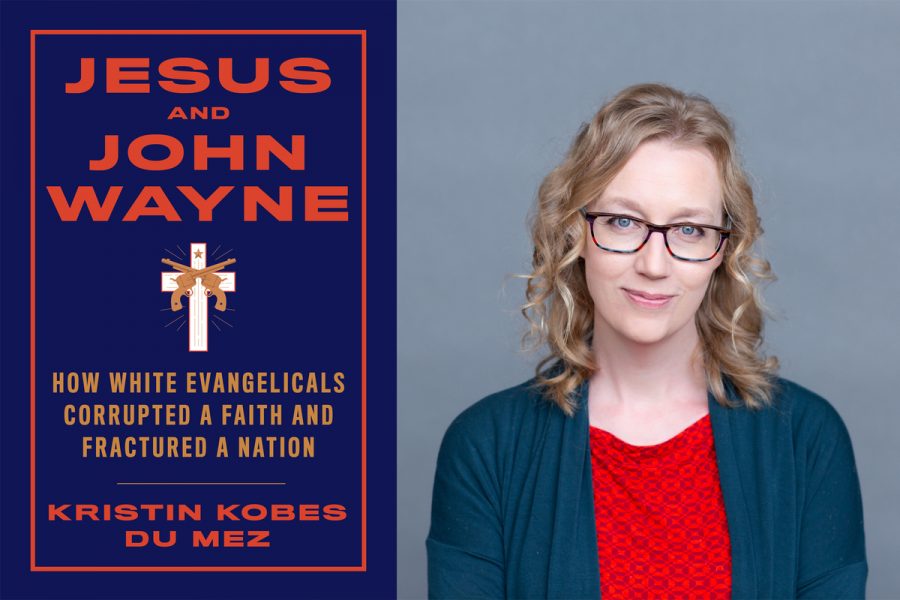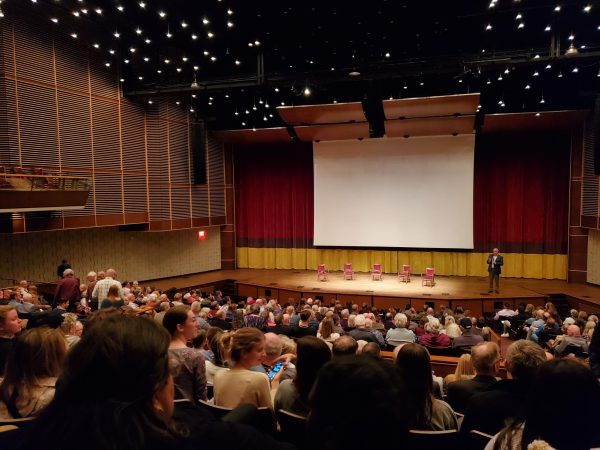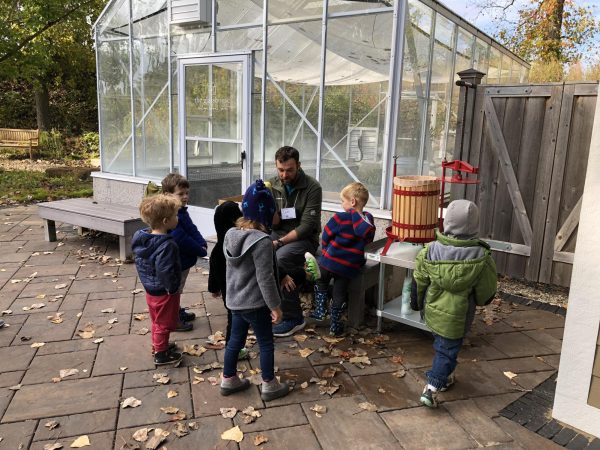A faith and nation fractured: Prof. Kristin Du Mez reflects on book reception and upcoming elections
Du Mez was inspired by Calvin students to trace connections between evangelical masculinity and militarism.
This past June, “Jesus and John Wayne: How White Evangelicals Corrupted a Faith and Fractured a Nation” hit the shelves and has since made waves. In four months, “Jesus and John Wayne” has been reviewed and featured by such publications as National Public Radio, the National Book Review, and Baptist Global News. In the book, author and Calvin history professor Kristin Kobes Du Mez traces the historical swing led by white evangelicals from Jesus the lamb towards Jesus, the rugged, masculine war hero. It points to President Donald Trump’s election as evidence of this phenomena, not shying away from political consequences.
Chimes spoke with Professor Du Mez about the book’s reception, backlash, and consequences for the upcoming election.
Chimes: It’s been nearly 4 months since Jesus and John Wayne was published. What has the overall public reaction been?
Du Mez: Overall, the public reaction has been remarkably positive, both among scholarly communities across a variety of disciplines (sociology, political science, philosophy of religion, and history), but also, perhaps even more surprisingly, among white evangelicals themselves. I’ve been contacted by hundreds of evangelicals, many deeply embedded in conservative evangelical churches and organizations, saying essentially some version of the same thing: “This is the story of my life,” and “thank you for helping me to see this.” I think many evangelicals have a deep sense that something is not right, but they haven’t been able to articulate exactly what, or to recognize how deeply rooted this “corruption of the faith” actually is.
Chimes: What inspired you to write the book?
Du Mez: It was actually Calvin students who inspired the book! When I first arrived at Calvin more than 15 years ago, I was teaching a class on U.S. history, and after I finished a lecture on Teddy Roosevelt (demonstrating how his ideas of masculinity were linked to ideas of race, militarism, and American power), two students came up to me after class to tell me that there was a book I needed to read. That book was John Eldredge’s “Wild at Heart.” Eldredge opens his book with a quote from Roosevelt and goes on to sketch a very militant and militaristic ideal of Christian manhood. From that point on, I began to trace connections between evangelical masculinity and militarism. At that time, however, I had no idea that it would culminate in the election of Donald Trump!
Chimes: Did you have any hesitations, considering the potential reactions of more conservative members of the communities you are a part of?
Du Mez: I think that was always on my mind, to a certain extent. I don’t actually enjoy conflict, but it was important to me to tell the truth. Over the course of my research, I’d come to see how many times evangelicals sacrificed truth in the hope of avoiding conflict. They failed to call out abuses of power and even covered up and condoned sexual abuse in their own circles over and over again. I wanted no part in that. I love the quote from Rachael Denhollander that I include in the book: “The gospel of Jesus Christ does not need your protection.” Instead, Jesus just requires obedience—and that obedience is manifested in the pursuit of justice, in standing up for the victimized and the oppressed, in telling the truth. This really captures what I set out to do in “Jesus and John Wayne.”
Chimes: Has there been any backlash from members of your community in Iowa and Dordt University?
Du Mez: I was invited to give a high-profile public talk at Dordt, and that sparked local opposition.… Before rising COVID cases caused my talk to be moved from in-person to remote, I did receive some well-intentioned advice to take security precautions for my visit, so apparently some of the opposition was quite heated. Given the opposition and rumors of threats, I was especially disappointed that I couldn’t appear in person. I don’t think this is a time to act out of fear.
Chimes: Has there been any backlash from members of the Calvin community?
Du Mez: Not that I’m aware of! Well, I should say that I received one disapproving letter from an alum of the college, but many, many letters of gratitude from alums, parents, constituents, and students.
Chimes: Have there been any positive reactions coming from those you might not have expected them from in either of these communities?
Du Mez: Absolutely. [I’ve been] struck by how many evangelical leaders are reaching out to me and thanking me for the book. I won’t name names, but I continue to be amazed by the humility with which the book is being received in these circles. I should also add, however, that many evangelicals who reach out to me also express reluctance to share their thoughts publicly. Pastors fear losing their churches, leaders fear losing donors, publications fear losing subscribers. Although the reception has been overwhelmingly positive, what I’m hearing also affirms what I found in the book—that the power dynamics within evangelical organizations and institutions make it difficult for people to speak out against the “corruption of the faith” they’re witnessing.
Chimes: November 3rd is right around the corner. In light of what you wrote in this book, how are you feeling before this upcoming election?
Du Mez: I’m feeling concerned, and, to be honest, exhausted. I don’t think we’ll see any sizable shift in the white evangelical vote, although I’d love to be surprised. We might, however, see the defection of a small number of evangelical voters, and that could be enough to sway the election. I really don’t know what to expect on Nov. 3, but whatever happens, as I say in the book: None of this began with Donald Trump, and it’s not likely to end with him.
Chimes: Do you have anything you’d like to share with the voting student population at Calvin?
Du Mez: Above all, vote! [Use] the opportunities you have here at a Christian liberal arts university to expand your awareness of what is at stake in this election. Talk to international students and listen to what they have to say. Especially if you are white, listen to the voices of people who are not white. Strive for a sophisticated understanding, not just of history, but also of theology and the social sciences as you determine what choices you are making as you cast your vote. As a historian, I’ll also add that this election will have a critical bearing on the resiliency of American democracy. Voting is critical, but this is also a moment to go above and beyond. Think about volunteering, encouraging others to vote, and doing everything possible to make sure that all Americans have a voice in this political moment.









Joyce • Oct 18, 2020 at 7:20 pm
Thank you for speaking out through this book and in this interview. I’m sure you’ve received, as you said, many positive remarks and probably negativism as well. Personally I’m from Oostburg Wisconsin and I know your father-in-law and Jeannie as well. We were in the same class in the Christian school and high school. I was blessed to go away to school after high school and away from that conservative dogmatism. Keep on keeping on. We need voice is like yours to speak for us.
Fran. Brusse • Oct 18, 2020 at 7:07 pm
I am from oostburg wi. Very conservative Town with little patience for anyone who is not. I grew up here. Went to the Christian school n have had many issues with the church in my later years. (I’m 70). It took great courage for you to write this book and I applaud you!! I am anxious to read it
I am a Christian but do not call myself an evangelical nor do I identify with them. Thank you for speaking out. Too many are afraid to do so